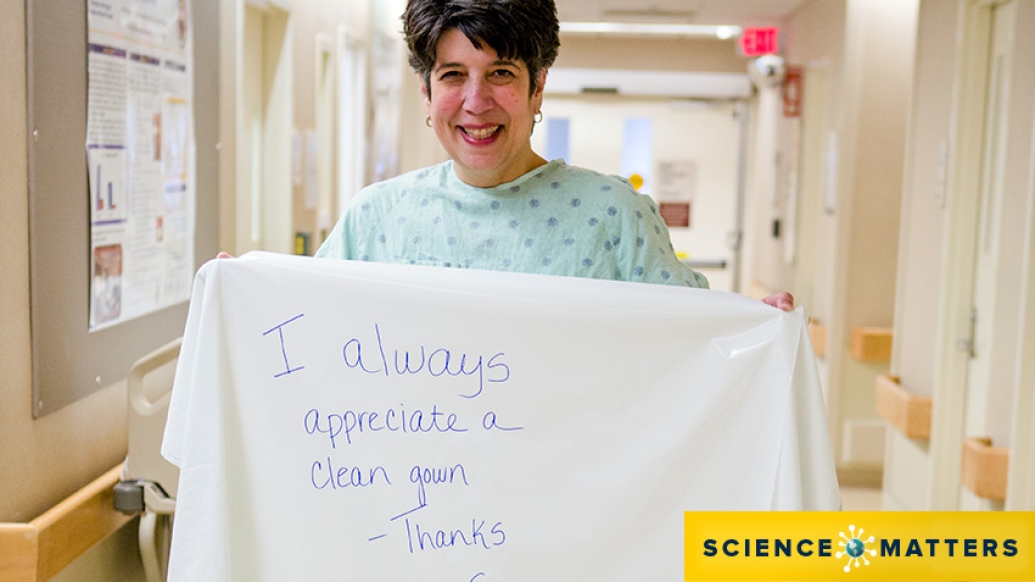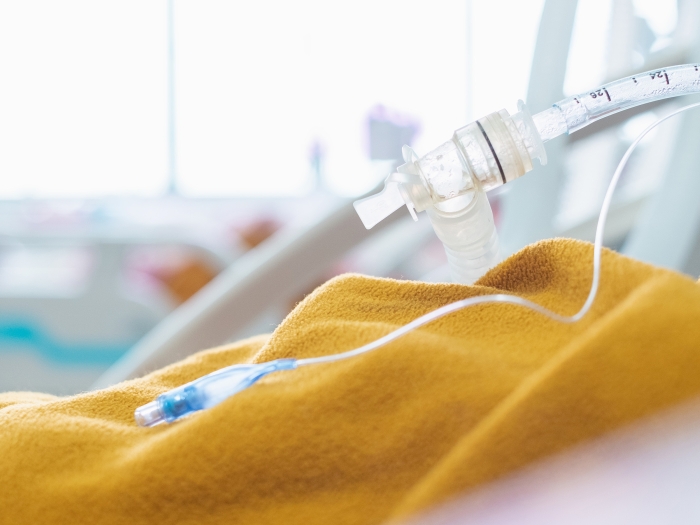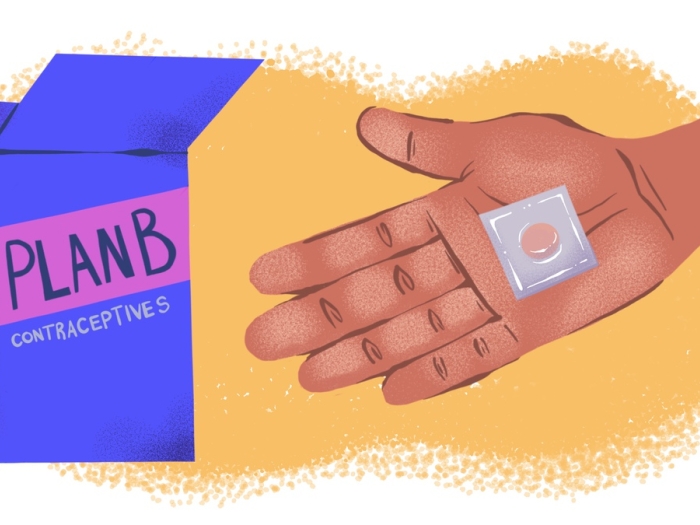A patient with chronic pancreatitis is helping shape research on vascular access devices — and much more — at Michigan Medicine.
7:00 AM
Author |

You might think that someone who spends nearly two months of every year in a University of Michigan hospital room would want to stay as far away as possible the rest of the time.
But not Georgiann Ziegler, 55.
MORE FROM MICHIGAN: Sign up for our weekly newsletter
In fact, she says, it's what she's experienced as a "frequent flyer" at U-M over the past 12 years that keeps her coming back — not just as a patient, but as a key member of several research and health care improvement teams.
"I'm a firm believer that what they learn today from me could help somebody else who won't have to deal with what I'm dealing with," she says. "It may not help me today or tomorrow, but it definitely will help the next generation and maybe even me down the road."
A patient behind the scenes
Ziegler has chronic pancreatitis, a disease that causes flare-ups of painful pancreas inflammation.
She also has a port, a device implanted just under the skin of her chest that lets her care team deliver pain medicine, liquid nutrition and more, without having to find new veins for needles every time she comes to the hospital.
Ports and their temporary cousins, PICCs, are known as vascular access devices because they provide a direct gateway to the bloodstream. They make life a little better for many patients and caregivers.
But because they can act as highways for germs to enter the body, or for dangerous blood clots to form, they also carry serious risks. Ziegler experienced such a clot — a deep vein thrombosis — herself.
Several years ago, U-M doctors who had done research about the uses and risks of PICCs and ports decided to make a guide to help doctors and nurses around the world understand which device to use, in which patients, and when, to get the best and safest result.
That's where Ziegler came in.
The doctor who first suggested she get the device asked her to join the team writing the guide. Vineet Chopra, MBBS, M.Sc., was gathering PICC and port experts from U-M and around the world, and he wanted a patient's perspective. And who better than Ziegler?
Even though she's not a shy person, she remembers feeling a bit of awe when she sat down at the table with the doctors, nurses and safety experts.
But then came a pivotal moment — when the experts were debating a point about numbing the skin of a patient getting a new device. The only one in the room who knew just what that felt like was Ziegler. She helped them understand the issue from a patient's perspective.
"As a patient or family member, we do not realize the work, time and dedication that goes into implementing the things out there that make us better," she says. "Now that I've been able to sit in on these efforts, I see it's not just someone saying, 'I think we should do it this way.' I have a greater appreciation for the things that are being done for me, and other patients, day by day in health research."
The team of experts published its guide, called MAGIC, for Michigan Appropriateness Guide for Intravenous Catheters, in 2015. Since that time, Ziegler has helped spread the word, bringing the patient's perspective to gatherings of health care providers learning about the guide.
SEE ALSO: How Cancer Research Gave Hope to a Patient Previously Out of Options
"Having Georgiann as part of our MAGIC development team was invaluable," says Chopra. "She provided an important perspective on selection of vascular access devices, including what types of information patients need and how best to share decision-making with patients. Without her input, I am certain that the final product would not have had this important viewpoint for providers and stakeholders."
Above and beyond
Ziegler's role in improving care didn't end with MAGIC. She now serves with Chopra and other patients and providers from around the country on the steering committee of an effort called i-HOPE.
Short for Improving Hospital Outcomes through Patient Engagement, it's an effort the federal Patient-Centered Outcomes Research Institute funds to better understand how patients, families and others view the most important gaps in hospital care.
"Most patients and family members don't have an understanding of how hard it is to get things implemented and to have it done right," she says. "They don't understand the behind-the-scenes work. As a patient, it excites me to see that nobody's giving up, especially when you have a condition like I have."
Ziegler also serves on Michigan Medicine's Patient, Family, Staff and Faculty Advisory Council and in the U-M Medical School's education program for medical students to learn from patients. She's agreed to let her blood be used for laboratory research on pancreatitis, and she allows student nurses to practice their port-related skills on her. She crochets blankets for hospitalized patients. And she even posed for a photo shoot to remind hospital laundry workers how much patients appreciate the clean sheets and gowns they deliver around the clock.
She's also seen how care at U-M has changed over the years because of new research on the best way to treat patients like her or prevent things such as infections and deep vein thrombosis.
That kind of research — aimed at improving health care delivery — may not get as much attention as the latest drugs for cancer or kidney disease, she says. But she hopes that funding for it stays strong.
"We can learn a lot from what's already been done, but everything evolves and we have to keep moving forward and figure out best practices that work," she says. "I hope that the passion I saw around the MAGIC table continues and that I can say to the researchers, 'Thanks for doing this, because the things you find are helping me and other patients.'"
To learn how you can take part in research at U-M, as a healthy volunteer or in studies that need people with certain medical conditions, visit UMHealthResearch.org.

Explore a variety of healthcare news & stories by visiting the Health Lab home page for more articles.

Department of Communication at Michigan Medicine
Want top health & research news weekly? Sign up for Health Lab’s newsletters today!





